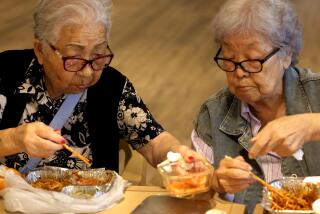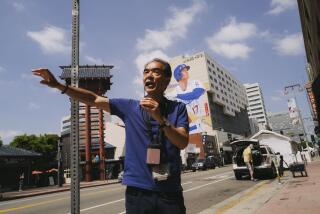LITTLE TOKYO : Merchants Consider a Self-Imposed Tax
- Share via
Deserted streets at night. Poor lighting at key intersections. Lack of evening police patrols.
Merchants in Little Tokyo have complained to city officials about such conditions since the 1992 riots.
While the city is strapped for money to promote and provide additional services to the area of more than 300 businesses, some merchants are considering another funding source: themselves.
A task force of the mayor’s Little Tokyo Community Development Advisory Committee has distributed two surveys to 271 merchants asking whether they would be willing to tax themselves and how they would want to spend that money.
“We’re not getting the necessary services here in Little Tokyo,” said Mark Takeichi, assistant project manager for Little Tokyo Service Center’s community development corporation. The center is spearheading the survey drive and educating the community about the tax proposal.
“In order to do that, we need something that the business owners want to buy into--something that would create more services and programs in the area.”
That could be a business improvement district, similar to the city’s first on Broadway, between 2nd and 9th streets.
Takeichi said money for the district would come from an increase in business-license taxes.
The city clerk’s office would collect that extra money and give it back to the district’s merchants committee, which would use the funds to promote businesses through special events or to beautify the area with street maintenance and renovation, he said.
If Little Tokyo were to become the city’s second business improvement district, 51% of its merchants would have to agree to the change, Takeichi said. The City Council also has to approve the merchants’ decision.
Takeichi said 71 of the 271 merchants polled in the first survey listed security and marketing of Little Tokyo as their top concerns. Results of the second survey, which asked how much of an increase businesses would agree to, are not yet available, Takeichi said.
Money could be the stumbling block to the business improvement district, some merchants said.
“A lot of people might think the concept is good,” said Frances Hashimoto, owner of the Japanese pastry shop Mikawaya. “(But) the climate right now is not real good. . . . A lot of the businesses are trying to maintain whatever little they have.”
Tom Kurai, spokesman for the Japanese Village Plaza, said it could be a year before merchants are willing to invest in the area. The plaza houses 45 shops and offices.
“We need to do more education,” Kurai said. “(Merchants) need to see more general positive increase in business here . . . something that will give them a little ray of hope.”
More to Read
Sign up for Essential California
The most important California stories and recommendations in your inbox every morning.
You may occasionally receive promotional content from the Los Angeles Times.










